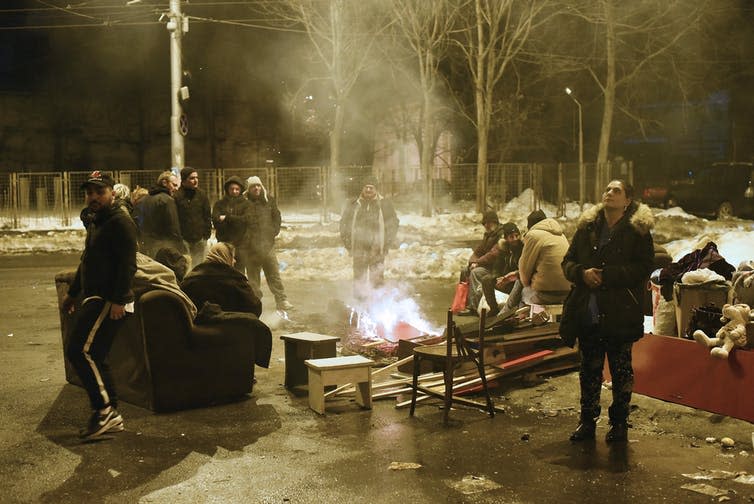To Europe's shame, Roma remain stigmatised outsiders – even when they live in mansions
Anti-Roma sentiment and negative stereotypes across Europe are so pervasive that even wealthy Roma families face stigma and inferior treatment. That’s the finding of our new research on wealthy Roma households in Romania, which exposes the deep-seated stigmatisation of Europe’s perennial “outsiders”.
Most government and EU policies dealing with the integration of Roma across Europe are fairly consistent. They talk the talk of integration: “social capital”, “empowerment”, economic and labour market “inclusion”, “desegregation” or “participation”.
Yet, in my research with human geographer Remus Cretan, we found that wealthy Roma households in Romania who are economically active, upwardly mobile, and live in conventional housing in mixed neighbourhoods, still face the same stigmatisation as those Roma households who live in abject poverty within segregated ghettos.
We interviewed 60 Roma households in south-west Romania whose relative wealth challenged the dominant perception of Roma as an economically excluded group living in degraded environments. And our analysis of Romanian print media over a five-year period between 2012 and 2016 showed heightened attention to “wealthy Roma” and criticism of “ugly Gypsy palaces”, particularly since 2013 and an escalation in populist rhetoric.
Roma settlement in more affluent neighbourhoods is met with hostility and protest. Yet many interviewees faced unfounded accusations that their wealth was a result of begging and theft, or that their daughters were sex workers, and their children faced the same accusations from peers. They are invariably accused of building their wealth on illegal activity, a criticism that draws on longstanding stereotypes of criminality and deviance. Those Roma who do achieve social mobility in Romania are often met with accusations of belonging to a “Roma mafia”. All this serves to undermine economic progress and leads to Roma avoidance of public spaces, stifling “integration”.
Widespread prejudice
The marginalisation of Roma across Europe raises fundamental questions about the EU project. For the political right, Roma are used as a means of mobilising anti-EU sentiment within Europe. For the left, the systematic and toothless failures of EU policy to address widespread Roma racism undermines the rhetoric of the EU as an inclusive, rights-driven project, but also serves as a reminder of the importance of the nation and national character.
From day-to-day interactions through to political rhetoric, Roma are largely treated by wider society as inferior. In November 2017, Lisa Evans, the wife of Northern Ireland footballer Corry Evans, posted an offensive tweet after a Romanian referee awarded a “dodgy” penalty for a highly questionable handball on the part of her husband. She wrote: “Romanian gypsy c**t!!! And to actually think Northern Ireland has probably homed one of his smelly relatives!! Ungrateful t**t!! Anyway onwards and upwards.”
She later deleted the tweet and apologised for posting it, but her words captured the scale of the task in hand. Conflation of the Romanian nationality with the diverse Roma ethnic group underscores the widespread level of ignorance. References to housing and welfare, hygiene and “ungratefulness” are all longstanding Roma stereotypes that seem to roll off the tongue. It’s as if Roma are sub-human.
Perhaps unsurprisingly, when faced with such hostility, many Roma show a tendency towards avoidance and separation – a protective retreat into the private sphere of the family or the group. Though there is sometimes resistance to eviction and ghettoisation, often the burden of stigmatisation, or the threat of violence, drive Roma to avoid interaction and public spaces altogether. Sites and opportunities for meaningful interaction are severely curtailed, further perpetuating stereotypes. Certain myths – such as that Roma “steal babies” – are all the more powerful when backed by political or media rhetoric and the actions of state officials.

Seen as the Roma’s problem
Yet often, Roma separation and exclusion is seen as a problem of Roma: it’s Roma themselves who need to change. Roma culture and customs are presented by both the right and the left as the problem and a threat to non-Roma. These perspectives always lack historical perspective and serve to make racism against the Roma invisible. For example, 500 years of slavery in Romania or the Romani Holocaust are key contexts for understanding the position of Roma, but these histories are woefully neglected.
Read more: The genocide of the Roma – and how commemoration of this 'forgotten Holocaust' is shifting
While our research in Romania captured the socio-economic diversity of Roma families beyond poverty and deprivation, it also exposed how consistently they are harassed and stigmatised, regardless of wealth. The power of group stigmatisation is such that Roma retreat from the public sphere, and so maintain their separation and diminish the chance of bonds and identification with non-Roma.
Until the longstanding and widely held perception of Roma inferiority is acknowledged and better understood, then policies of Roma “integration” can only be partially successful. Only through an understanding of group stigmatisation and its drivers can racist attitudes be addressed effectively. And perhaps then Europe’s longstanding shame can lead to more opportunities and spaces for meaningful interaction between Roma and non-Roma.
This article was originally published on The Conversation. Read the original article.

Ryan Powell does not work for, consult, own shares in or receive funding from any company or organisation that would benefit from this article, and has disclosed no relevant affiliations beyond their academic appointment.

 Yahoo News
Yahoo News 
